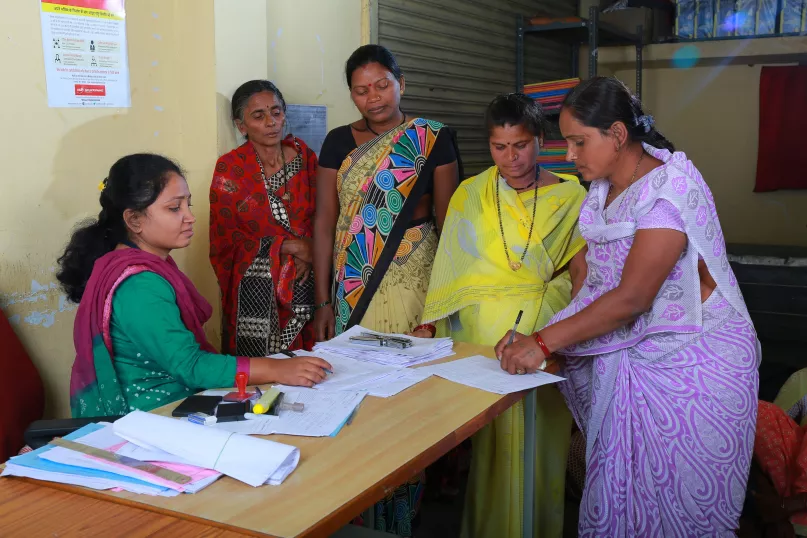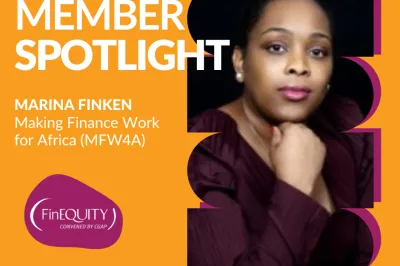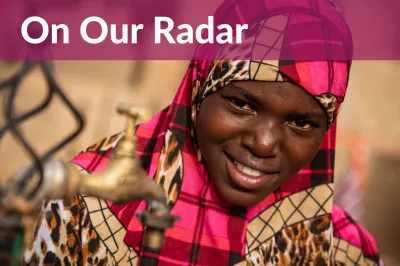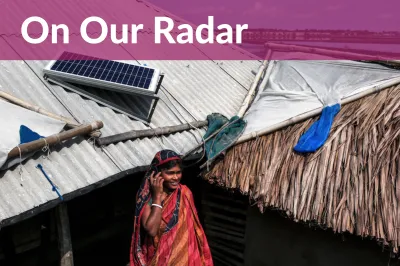Diagnosing Gendered Social Norms Can Unlock Pathways For Achieving Women’s Financial Health Outcomes

Global Findex 2017* data showed that 77% of women in India owned a bank account at the time, a significant improvement from 2014. However, boosting ownership of accounts alone is not enough to fulfill the goals of financial inclusion – the same data also indicates that almost 54% of those women-held accounts were inactive in 2016.
Current global evidence shows how digital and mobile money accounts offer women the requisite privacy and control over their finances, but such benefits for women using technology are far from universal. For instance, in India, only one in five women use mobile internet. Additionally, women in developing countries often share a phone with other members of their family which is a risk to their financial privacy and control.
As technology advancements give rise to new digital solutions and increased financial inclusion, women continue to be excluded and disadvantaged. A key reason being that many solutions are designed to be gender-neutral, discounting the reality that men and women engage differently with money, livelihoods and digital devices. Women’s behaviors, capacities and constraints are highly conditional on, among other factors, gendered social norms that are central to their context. Gendered social norms, a subset of social norms, prescribe different roles and expectations to men and women in households, communities, markets and public life. They have critical bearings on women’s access to resources, whether it be skills, business knowledge or access to capital; and their financial behaviors – how they save, spend, plan or borrow.
Understanding gendered norms can provide critical data and contextual cues for designing women-centric systems
Interventions in the financial services sector tend to focus on enhancing women’s financial agency by increasing their access to financial services and digital tools without accounting for a woman’s immediate and external context or considering the inflection points in her life’s journey where interventions will be most effective. If financial services interventions want to enhance women’s ability and agency to use resources to achieve their goals, they need to go beyond just looking at women’s financial behaviours and dig deeper to understand the norms that shape their choices (or lack thereof). For this change to happen, our efforts must go beyond merely trying to increase women’s financial transactions and focus on the underlying social and gender dynamics that can limit the effectiveness and impact of these interventions.
To understand and address the latent factors that shape women’s financial health journeys, the Centre for Financial Health (CFH), housed at UNCDF, has partnered with the State Government of Odisha in India under their flagship program Mission Shakti. Over the next four years, the program aims to improve the financial health outcomes of 3.5 million low-income rural women and women entrepreneurs and build 10,000 women-led micro-enterprises in the state. In collaboration with public and private sector stakeholders, CFH’s efforts are directed towards developing a women-centric financial system through the programme that advances their income earning opportunities and builds their financial agency.
Through our design-oriented research, we recognised a few contextual cues that can serve as the starting points for policymakers and financial service providers in designing mindful systems that work for women. We are also integrating a social norms diagnostic into our learning framework as a part of the CGAP and FinEquity peer learning program “Social Norms Diagnostic Co-Lab” which aims to understand how social norms affect women’s financial health in specific contexts.
Women’s collectives that are a step ahead in their enterprise journey need customised solutions
Women are not a homogenous group, and their capacities and limitations are dependent on their demographic, socio-economic and cultural context. Our research in two locations in Odisha showed that women in collectives (self-help groups (SHG) or producer groups (PG) with a strong group leader are more likely to find support from family and community members in engaging in income generating activities, growing their business network and saving for future needs. Gendered norms tend to be more relaxed in the households of collective members as the group leaders are revered by the community.
We noted that in many such women’s collectives, the group president also counsels other individuals in the member’s families to garner their support. With the help of local frontline staff, these women’s group leaders offer advice to families on government schemes and benefits of women being part of the SHG, while also explaining the advantage of having an additional income to support household expenses through SHG business activities. Over time, family members start trusting the president’s advice and support the women in their household to attend SHG meetings and take part in collectives’ business.
"We tell the husband of the women SHG members about the benefits of coming to the SHG meetings regularly, the schemes offered when we participate in group savings. Slowly they [family members)] start seeing the merit in women coming together, working and earning an income. Many families now trust me and seek information from me directly."
Mapping out these collectives and studying the qualitative aspects that set them apart has been particularly compelling. The women’s groups are in a significant space of transition for entrepreneurs who have navigated the initial barriers posed by gendered norms. Their business and financial requirements are different from other groups who are just forming, as are their training needs. Providing support at this juncture can help accelerate their economic and financial journeys.
Learning from these cases can provide insights into how women can deviate from gendered social norms and garner support from their husbands, other family members or influential community members to operate their own business or making financial decisions. Such insights not only inspire program design but add immense value for peer-to-peer learning among women collectives as well. Evidence from other successful women-centred collectives suggests that the visibility of women that have deviated from the predominant norm can influence women’s aspiration as well as the views of their reference groups.
Norms affect not only women but also the institutions that serve them
We observed that actors such as frontline staff for the government program or financial service providers often have their own experiences, beliefs and perceptions of working with the community and about women and their role in it. While all staff acknowledge the gendered norms faced by women, they often don’t recognise their own subconscious biases. The frontline staff are often bound by the same social norms that shape the behaviour of the women they serve. In some cases, where they do feel that norms can be tackled, they don’t know where to begin.
For instance, a female community resource person (CRP) in a village in the Ganjam district of Odisha pointed out that women who operate their own business have little control over their income. To avoid any conflicts at home, these women prefer to set aside some portion of their business income for their husband’s expenses rather than saving it. The CRP expressed her own inability to identify meaningful ways to engage with men in the community to change this practice. What this frontline worker and others need is a toolbox that allows them to understand how norms impact a given situation and steps that can be taken to mitigate those effects. For example, how can frontline workers identify and interact with men, community gatekeepers and leaders to advance women’s collective livelihood?
Norms come with their own nuances that add to the challenge of addressing them
Norms can be tricky, and their nuances can affect behaviours differently under seemingly similar circumstances. In the interviews we conducted, most women reported having household debt. Taking on loans for household consumption or needs is very common in the districts we visited. It would appear that women are also comfortable borrowing money for operating a business, but we observed that when it comes to taking a loan for their own business, women are scared of the backlash (such as ridicule and disapproval) they might face from their family or community if they fail. For instance, one SHG member who runs a small business said, “I am scared to take a loan to expand my business because if I fail to repay the loan, my in-laws will stop me from running my business altogether and I will lose whatever little income I earn now… our community feels that a woman should not burden her family with her debt.”
"I am scared to take a loan to expand my business because if I fail to repay the loan, my in-laws will stop me from running my business altogether and I will lose whatever little income I earn now… our community feels that a woman should not burden her family with her debt."
So, while access to credit is a big issue, it is not the only one at play. We must consider how women can gain confidence in running and growing a business, which will happen when they have a social network of support and a stronger infrastructure that recognises their unique potential and limitations and works to improve their capacity.
Women find their own ways to circumvent barriers by making allies
In many cases, women have enlisted the help of men. We observed multiple collectives and individual entrepreneurs who have taken loans and are running a business along with their spouse or a male family member who is able to bring networks and knowledge to the enterprise. While it may not guarantee full agency of women in the business, it does set a different trend that can cause norms to relax.
Women we spoke with also felt that when their spouse is engaged in their business from the start, they find more emotional support at home and are better able to be a part of the decision-making process. This highlights the importance of designing interventions that include men and other key stakeholders in women’s reference network at the household and community level for women’s economic and financial success.
Research shows that interventions targeted at changing norms are more likely to succeed when accompanied by incentives or other interventions to remove barriers. For instance, in Nepal, Sammanit Jeevan, the “Living with Dignity” intervention targeted not only married women but also their family in its design and ensured that young married women led income generating activities with assistance from at least one family member. Not only did the strategy increase occurrence of income generating activities, it also modified the family’s views about women’s abilities to contribute financially to the household.
Mapping of such collectives and individual entrepreneurs that are working with their family members as allies can provide critical data to inform programmatic perspective, points-of-entry to work with men and community in general, guide policy decisions and even provide insight for financial services.
Unboxing women’s potential to inspire design
Our observations show that when women identify their limitations and capabilities and find ways to make use of their resources on their own terms, it has a cascading effect. When women get into the workforce, businesses and governments can capitalise on their savings behaviours, increase uptake of responsible credit, and even open up paths to old-age pension plans. Shifting the focus from financial transactions to financial health outcomes that help women enhance their capacities and overcome their constraints, can strengthen women’s ability to bend and eventually transform norms by unlocking their own potential.
*Global FindDex 2021 is set to release June 29, 2022 and will have updated figures.



Valuable insights for incorporating gender norms into products that improve financial health outcomes for low income women. The SHGs should leverage their better bargaining power to help women members obtain greater agency over their financial futures.
Excellent piece
Leave a comment